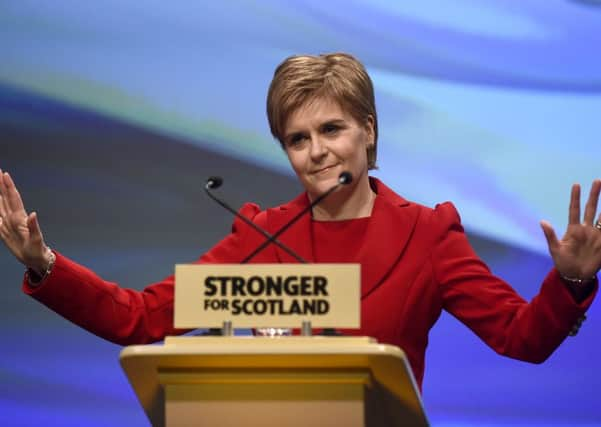Ian Swanson: Sturgeon to deploy the art of gentle persuasion


That was the finding of a weekend opinion poll, which suggested a new vote on independence in such circumstances would see the 2014 result of 55 per cent No, 45 per cent Yes transformed into 53 per cent Yes, 47 per cent No.
These are encouraging figures for pro-independence campaigners eager for another opportunity to vote on Scotland’s future.
Advertisement
Hide AdAdvertisement
Hide AdFirst Minister Nicola Sturgeon has said more than once that while she wants the whole United Kingdom to stay in the EU, a UK decision to leave while Scotland voted to stay would likely trigger a new independence referendum.
Yet in her speech to the SNP spring conference last weekend, where she had an enthusiastic crowd of supporters in the hall and a large audience via TV, all ready to hear her chosen message, she opted not to mention the idea.
Perhaps she fears that the prospect of Scotland leaving the UK would sound too attractive to some voters south of the Border – like those who were scared out of voting Labour at last year’s general election by the idea Ed Miliband would end up in Alex Salmond’s pocket – and they would be galvanised into voting for Brexit.
Or, more likely, she is worried that even Scotland being forced to quit the EU would not give a big enough boost to the independence cause to be sure of victory in a new referendum.
Advertisement
Hide AdAdvertisement
Hide AdMs Sturgeon has been clear that she only wants to ask people to vote again if there is “strong and consistent” evidence that independence has become “the choice of a clear majority in the country.” Strategists have allegedly decided that means the polls must show stable 60 per cent support for independence for a year before a referendum is called.
So Ms Sturgeon does not want to get boxed into guaranteeing a referendum on the basis of Brexit.
Rather than refer to that scenario in her conference speech, she announced the SNP would embark on “a new initiative to build support for independence”. It will get under way in the summer – presumably well after the Holyrood elections and the EU referendum are over.
And the First Minister was quick to promise: “It will not be an attempt to browbeat anyone.”
Advertisement
Hide AdAdvertisement
Hide AdThe huge surge in SNP membership in the wake of the 2014 referendum saw many enthusiastic Yes activists enlisting for the first time and immediately becoming the majority in the party. In many ways Ms Sturgeon is lucky she has not come under more pressure from the newcomers to go for an early re-run of the plebiscite.
Thankfully for her, they seem largely to have submitted to the same self-discipline displayed by the rest of the party and are following her lead.
There were big questions raised during the referendum campaign which voters felt were not properly answered – on issues like the currency. And since then, big questions have arisen about the economy thanks to the collapse of oil prices.
Ms Sturgeon acknowledged: “Many wanted to be persuaded in 2014 – but ultimately didn’t find our arguments compelling enough.” And she said in addressing people’s questions the SNP would be “prepared to challenge some of our own answers”.
Ms Sturgeon is surely wise to be cautious about the timing of any future referendum. She is certainly right that the independence campaign needs to sort out its pitch.